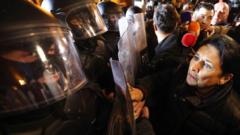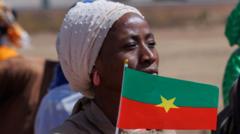As her presidential term nears its end, Zourabichvili claims she symbolizes Georgia's sovereignty against a government aligned with Russia, potentially leading to a historic standoff that could reshape the nation's political landscape.
Georgia's President Salome Zourabichvili Defies Government and Prepares for Confrontation

Georgia's President Salome Zourabichvili Defies Government and Prepares for Confrontation
In the heart of Tbilisi, Georgia's pro-Western president, Salome Zourabichvili, refuses to relinquish her role as leadership tensions escalate.
Georgia's pro-Western president Salome Zourabichvili stands firm as her term approaches its conclusion, preparing to confront the newly elected successor Mikheil Kavelashvili, backed by the ruling Georgian Dream party. On the eve of termination, Zourabichvili, who has characterized the election of Kavelashvili, the sole candidate chosen through an electoral college system, as an affront to democracy, emphasizes her resolve to remain in office, asserting her role as the last legitimate institution in the country. The government warns that failing to vacate her position could lead to criminal charges, yet Zourabichvili argues such actions would complete the takeover of Georgia by a party she accuses of capitulating to Moscow.
Born into a family of Georgian émigrés in France, Zourabichvili spent decades in French diplomacy before her return to Georgia. Since taking office in 2018, she has shifted from a pro-government stance to staunch opposition, notably criticizing Georgian Dream's increasing authoritarianism and refusal to support Western sanctions against Russia. With a notable public presence, she proposed a veto against a controversial "foreign influence" law, echoing sentiments of a nation caught between Western aspirations and Russian influence.
Despite initial skepticism toward her leadership, particularly among the youth, Zourabichvili has cultivated respect through her vocal opposition to government policies, rallying citizens against an increasingly autocratic regime. As the government prepares to transition power and potential impeachment attempts loom, analysts anticipate a pivotal moment in Georgian politics. While skepticism regarding her motives remains, many view her as a pivotal figure capable of mobilizing opposition forces against the ruling party. Political observers are closely monitoring the potential outcomes of this power struggle, with some suggesting she may emerge as a significant opponent to Georgian Dream, regardless of whether she's detained or remains in office. The mounting tensions echo the broader struggle of Georgia in aligning its future with Europe rather than capitulating to its historical adversary, Russia.
Born into a family of Georgian émigrés in France, Zourabichvili spent decades in French diplomacy before her return to Georgia. Since taking office in 2018, she has shifted from a pro-government stance to staunch opposition, notably criticizing Georgian Dream's increasing authoritarianism and refusal to support Western sanctions against Russia. With a notable public presence, she proposed a veto against a controversial "foreign influence" law, echoing sentiments of a nation caught between Western aspirations and Russian influence.
Despite initial skepticism toward her leadership, particularly among the youth, Zourabichvili has cultivated respect through her vocal opposition to government policies, rallying citizens against an increasingly autocratic regime. As the government prepares to transition power and potential impeachment attempts loom, analysts anticipate a pivotal moment in Georgian politics. While skepticism regarding her motives remains, many view her as a pivotal figure capable of mobilizing opposition forces against the ruling party. Political observers are closely monitoring the potential outcomes of this power struggle, with some suggesting she may emerge as a significant opponent to Georgian Dream, regardless of whether she's detained or remains in office. The mounting tensions echo the broader struggle of Georgia in aligning its future with Europe rather than capitulating to its historical adversary, Russia.




















